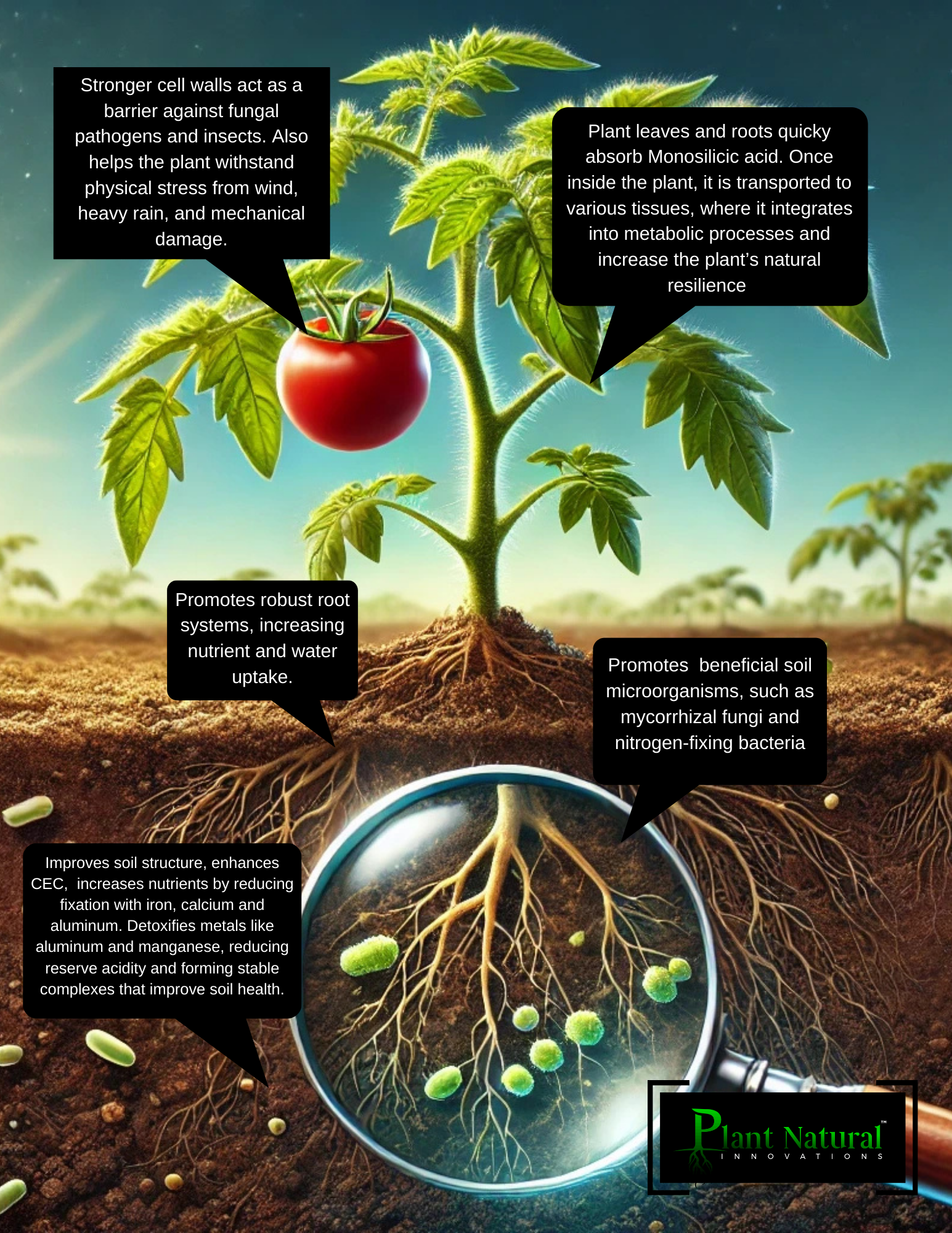Unlocking the Power of Silicon for Soil and Plants
How Zumsil® Can Transform Your Crop Yields
In the pursuit of healthier plants and more productive soil, one often-overlooked element can make a significant impact: silicon. Silicon isn’t just an essential component for plant resilience and soil health—it’s a powerful tool to enhance crop quality and yield. Here, we’ll explore how silicon works in soil and plants and why Zumsil®, a mono and poly-silicic acid-based soil conditioner, is one of the most effective ways to bring these benefits to your fields.
Why Silicon is Essential for Plants and Soil Health
Silicon is a beneficial nutrient that, while not considered essential in traditional plant nutrition, is increasingly recognized for its positive impact on plant resilience and soil structure. However, plants can only absorb silicon in its mono and poly-silicic acid forms, which are readily available in Zumsil®.
Silicon supports plant health in various ways, making crops more robust, resistant, and efficient at using available nutrients. By adding a silicon supplement to your soil management practices, you’re giving your plants the support they need to thrive in challenging environments.
The Benefits of Silicon for Plants
- Enhanced Stress Resistance
Silicon acts as a “shield” within plant tissues, fortifying them against environmental and biological stressors. Whether your crops are dealing with disease, pests, drought, or frost, silicon can help improve resilience. Zumsil® provides plants with absorbable forms of silicon, which can increase their ability to withstand stresses like extreme temperatures, drought, and insect pressure. - Improved Nutrient Efficiency
Silicon doesn’t just help with plant resilience—it also boosts nutrient uptake. By facilitating nutrient transport within plants, silicon aids in the efficient use of essential nutrients, especially phosphorus. This means crops not only grow faster but also reach their full yield potential with fewer nutrient inputs. - Stronger Cell Walls for Increased Protection
Silicon absorbed by plants is integrated into cell walls, creating a more rigid structure. This cellular strengthening protects plants against fungal pathogens and pests, reducing the need for chemical pesticides and helping crops grow healthier with less intervention.

How Silicon Enhances Soil Health
- Soil Acidity Management
Acidic soils can lock up essential nutrients, making them unavailable to plants. Zumsil® helps neutralize soil acidity, enhancing the bioavailability of nutrients, such as calcium and magnesium, and detoxifying metals like aluminum. With Zumsil®, your soil becomes a more productive, balanced environment for plant growth. - Detoxification of Harmful Metals
In soils with high metal concentrations, plants may struggle to access necessary nutrients. The reactive silicon species in Zumsil® bind to toxic metals, reducing their impact on plants and making the soil safer and more fertile. This detoxification process creates a healthier root zone, enabling crops to grow without the constraints of toxic interference. - Boosted Soil Microbial Health
Healthy soil is teeming with beneficial microorganisms that facilitate nutrient cycling and plant growth. Silicon fosters a supportive environment for these microorganisms, helping maintain a balanced soil ecosystem. The more active and diverse the soil microbiome, the more robust the nutrient exchange, leading to stronger, healthier plants.
Why Zumsil® is the Best Choice for Silicon Supplementation
Zumsil® is a powerful soil amendment and plant conditioner formulated with a 24% concentration of mono and poly-silicic acid, the only forms of silicon plants can directly absorb. Unlike other silicon sources, Zumsil®’s highly bioavailable form ensures plants can quickly and efficiently use silicon for growth, defense, and nutrient uptake. Here’s how Zumsil® works:
- Easy Silicon Absorption: Zumsil® is absorbed directly by plant roots, moving into tissues where it boosts resilience and nutrient utilization.
- Enhanced Soil Interaction: The reactive silicon species in Zumsil® neutralize soil acidity, improve nutrient availability, and boost Cation Exchange Capacity (CEC) for better nutrient holding and exchange.
- Increased Microbial Activity: Zumsil® supports beneficial soil microbes essential for nutrient cycling and soil health, contributing to a vibrant, productive soil ecosystem.
Integrating Silicon with Zumsil® for Better Crop Quality and Yield
Adding Zumsil® to your soil management practices can give your crops the silicon they need to grow stronger, healthier, and more resilient. Whether you're a vegetable grower, fruit orchard manager, or row crop farmer, Zumsil® offers a transformative way to boost plant health and soil fertility. It’s an easy-to-use, effective solution that delivers silicon in the form plants can immediately benefit from, leading to higher-quality crops and improved yields.
Start Reaping the Benefits of Zumsil® Today
If you’re ready to enhance your soil and crop quality, adding Zumsil® is a strategic choice. Explore more about how Zumsil® can elevate your soil health and plant resilience today by visiting TPS Lab’s website or contacting our experts.



